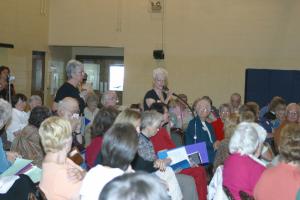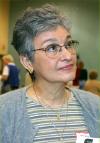Issue Date: October 24, 2003
Illinois Catholics take creative action in response to crisis By ROBERT McCLORY An itinerant biblical scholar and a coterie of restless laity are making
their presence felt in the sprawling, mostly rural diocese of Belleville, Ill.
The scholar is Fr. Roger Karban, who has been teaching scripture in parishes
and homes all over the diocese for more than 30 years, putting 700 miles on his
car a week ( Their efforts have given birth to a unique institution, the Southern Illinois Synod of the Laity, whose aim is to promote healthy relationships at all levels of the Belleville diocese, which is headed by Bishop Wilton Gregory, currently president of the U.S. Conference of Catholic Bishops. Evidence of the work was on display Sept. 27 when the synod held its fourth meeting, all within the last 15 months, at St. Mary’s parish hall in Mount Vernon, a town of some 16,000 situated amid vast acres of corn, beans and wheat. More than 150 persons turned out to strategize about making priestly celibacy optional and bringing the implications of the priest abuse scandal home to diocesan parishes. First they heard psychologist Eugene Kennedy deplore the narrow “administrative style” of present church leadership and call for a restoration of “the sacramental sense which sees the whole world imbued with the divine.” New creations like this synod, he said, are modern counterparts of old religious orders like the Franciscans, which emerged in dark times and stirred “healthy Christians” to take creative action. A deliberative council The concept of an ongoing synod emerged in April 2002 during a meeting of the FOSIL steering committee. Some 20 uninvited non-members from throughout the diocese arrived at the meeting and insisted that roiling problems in the church demanded more visible, independent lay initiative. Back in 1992 and 1993, the Belleville diocese made headlines when 13 of its priests (about 10 percent of the diocesan clergy) were removed from their parishes because of credible charges of child sex abuse. Gregory was much praised for his handling of the situation, but FOSIL members have since voiced concerns about his decisions in areas including financial settlements to abuse victims and the use of diocesan funds for the treatment of abusers. “We thought a synod would be a way to reach more people in the pews,” said Lena Woltering, FOSIL coordinator. “We called it a synod in the sense of a deliberative church council, and we thought, ‘Bishops have synods, why can’t lay people?’ ” Despite continuing enthusiasm for the concept, synod leaders admit achieving the overall aim -- restoring healthy relationships within church institutions -- is an uphill battle. The first synod meeting in the spring of 2000 drew some 250 people who heard experts talk about the rights and responsibilities of laity in the Catholic church. The gathering approved a no-nonsense letter that was delivered to the bishops at their meeting in Dallas in June 2000. “Now that the system we enabled to exist is crumbling under the weight of the sex abuse scandal, it is time we reclaim our dignity and obligation and become active participants in the restructuring of our church,” said the letter. “If the laity truly responds to the Spirit, the current crisis may well be the chaos from which a new church will emerge.” The synod members asked the bishops to make themselves accessible to the people and develop a relationship with the laity that is “trusting and nonadversarial.” The bishops did not respond. Gregory informed synod leaders, as they planned the second meeting, that they would not be allowed to meet on church property, so the event was moved to a Baptist church. Fifteen synod members picketed the chancery demanding an explanation, and Gregory later rescinded the ban. The leaders have continued a vocal and visible presence but their requests for discussion and dialogue have been met mostly with silence. On one occasion, 20 synod planners drove more than 100 miles to lead a prayer service outside the annual Belleville priests’ convocation, held in Kentucky. “We had signs calling for communication between clergy and laity and prayed for peace,” said Woltering. Several priests joined the group but Gregory ignored them, she said. Another prayer service was held outside the diocesan center in Belleville to protest the exclusion of synod representatives from a meeting on liturgical changes. At its most recent meeting, the synod agreed to send Gregory a letter differing with his public statements that mandatory clerical celibacy needs no reconsideration. “Contrary to your statements,” said an early draft of the letter, “this is not an issue that has surfaced because of the sexual abuse crisis. It has been a constant in every call for reform since Vatican II.” Later, after hearing the experiences of three members of SNAP, synod members agreed to try to have SNAP representatives speak at their own parishes. “Hearing from victims makes this whole thing so real,” said Terri Laurhammer, a young mother of two. “I don’t want my children growing up afraid of priests, and at this point I don’t trust the hierarchy to solve the problem.” Catholicism in a new light
What keeps these people pursuing their agenda? Almost to a person synod attendees said it was their heightened understanding as a result of taking classes with Karban, a priest and pastor in the Belleville diocese. Tary Harms, a synod leader said she is an active Catholic today “because of Roger.” Harms, a nurse, wife and mother, left the church in 1980 and stayed away for 20 years because a friend had been repeatedly denied permission by her priest to take the birth control pill. The first child born to her friend was hydrocephalic and severely mentally handicapped. So were the second and third children. The woman in desperation and guilt finally had her tubes tied. “What kind of a church is it,” said Harms, “that puts in a rule that devastates people psychologically and physically?” Several years ago Harms joined one of Karban’s scripture groups and came to see Catholicism in a new light. “This time I’m here to stay and I’m here to fight,” she said. “I only had a high school education,” said Agnes Donovan, 82. “But when I studied scripture and church history with Fr. Karban, I realized how much I had missed. I want the church to move ahead, not to go back to the old ways.” “If you don’t try to educate yourself, you’d be more comfortable, you wouldn’t be bothered,” said Arnold Huelsman, who sells grain elevator machinery. With the aid of Karban, he did read, he said, “and you’re eyes are open and then there’s no turning back.” Karban had a similar effect on Harold and Margaret Stahl, a retired farm couple. They became eucharistic ministers, lectors and Renew facilitators in their parish since realizing Christianity is a call to service. “What gets me,” said Harold, “is all those people in church on Sunday just sitting there. They don’t respond, they don’t sing, they won’t hardly say amen. Sure the Mass is different now, but you’d think it’s been around now long enough for them to wake up.” Woltering, 56, a wife, mother and grandmother, said Karban has had an impact on literally hundreds and hundreds of Belleville Catholics as well as on many St. Louis residents who also attend his classes. “He’s just a magnificent teacher who makes the scriptures come alive,” she said. “And it’s not simple, spoon-fed stuff. He uses sophisticated historical-critical exegesis.” Woltering said his classes were especially helpful to her during a period of disenchantment with the church. In her work as an interior decorator, she had been involved in refurbishing the cathedral rectory in the 1980s. “Talk about excessive spending,” she said. “They wanted a marble jacuzzi in the bathroom and a special little alcove in the wall for a television set, so they could watch TV while sitting in the tub.” Contact with the gospel message provided a grounding, said Woltering, that enabled her to get beyond her resentment. Meetings with Bishop Gregory In 1993 she became a major force in FOSIL, a regional affiliate of the national Call to Action organization. When then-Belleville Bishop James Keleher banned Fr. Richard McBrien’s syndicated column from the diocesan newspaper, The Messenger, she arranged to have his columns mailed monthly to FOSIL members and other interested persons, along with Karban’s scripture column, which runs in the diocesan paper. Since 1995 she also has arranged meetings three or four times a year between representatives of FOSIL and Gregory. These have yielded little in terms of agreement, said Woltering, “but at least he listens and he knows what we think.” The sessions have become rarer and more difficult to arrange, she added, since Gregory became president of the bishops’ conference. The synod -- and FOSIL itself -- are on the verge of some internal alterations, since Woltering may be moving soon to Fort Wayne, Ind., where her husband, David, has been transferred by his employers. She said other leaders like Tary Harms and Anne Harter will carry much of the load and she intends to remain involved to a limited extent. But how long can a sustained initiative go on, especially when major institutional change does not occur? “Maybe it’s a hopeless situation,” said Fr. Carl Kabat, an Oblate of Mary Immaculate who has attended most of the synod meetings. “But you do what you have to do whether it works or not.” Kabat, who is associated with the Catholic Worker house in St. Louis, has spent more than 15 years of his priesthood in federal prisons for illegally protesting nuclear weapons. Looking around at the earnest faces of the people at the synod meeting, he told NCR, “This is the church right here in this place. You do what you can. And then you hope and sing and dance.” Robert McClory, a longtime contributor to NCR, lives in Chicago. National Catholic Reporter, October 24, 2003 |

